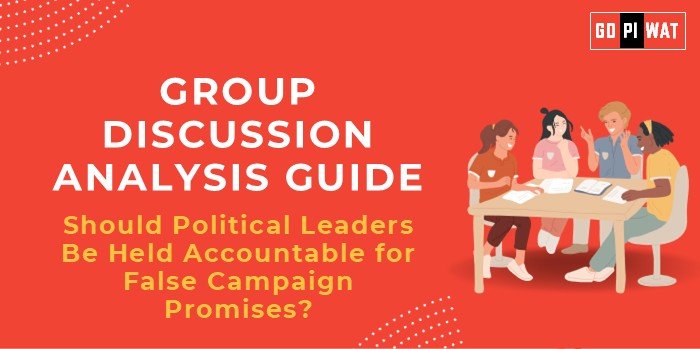📋 Group Discussion Analysis Guide
Topic: Should Political Leaders Be Held Accountable for False Campaign Promises?
🌐 Introduction
Political leaders frequently rely on campaign promises to secure electoral support. These promises shape voter expectations and reflect the governing party’s priorities. However, the debate over whether leaders should be held accountable for unfulfilled promises underscores significant ethical, practical, and legal considerations.
📊 Quick Facts & Key Statistics
- 🌍 Global Trust in Governments: Switzerland reported 84.6% trust in 2020, while many nations lag significantly.
- 📜 Electoral Manifestos: Key tools for parties to outline priorities and gain voter trust.
- 📈 Fulfillment Rate: Global studies show that 67% of campaign promises are fulfilled, leaving a significant portion unaddressed.
- ⚖️ Legal Accountability: Courts often rule that campaign promises are not legally enforceable under trade practices legislation.
🧑🤝🧑 Stakeholders and Their Roles
- 🏛️ Government and Politicians: Craft manifestos and govern based on campaign priorities.
- 🗳️ Voters: Elect representatives based on campaign promises and demand transparency.
- 📰 Media: Scrutinize campaign promises and hold leaders accountable.
- 🌍 Civil Society Organizations (CSOs): Advocate for increased political accountability and educate voters.
✨ Achievements and Challenges
- Achievements:
- 📈 Improved Democratic Engagement: Transparent political systems see higher voter turnout and engagement.
- 📜 Public Policy Reforms: Fulfilled promises drive societal progress, e.g., healthcare expansions or digital transformation.
- Challenges:
- ⚖️ Legal Loopholes: Lack of enforceable laws undermines accountability.
- ❌ Misinformation: Over-promising fosters unrealistic voter expectations.
- Global Comparisons:
- ✅ Switzerland: High trust due to transparent policymaking.
- ❌ USA: Legislative barriers often hinder campaign promises, such as healthcare reform.
💡 Effective Discussion Approaches
- Opening Approaches:
- 📊 Highlight fulfillment rate discrepancies (67%) and public expectations.
- 🔍 Use examples like Brexit to illustrate unmet promise impacts.
- Counter-Argument Handling:
- 📋 Stress the importance of ethical governance despite legal non-enforceability.
- 🛠️ Propose solutions like voter education and independent oversight bodies.
📈 Strategic Analysis of Strengths & Weaknesses
- ✅ Strengths: Fosters trust, strengthens democracy, encourages ethical leadership.
- ⚠️ Weaknesses: Legal enforcement challenges, risks of populist politics.
- 🌟 Opportunities: Use technology for manifesto tracking, promote civic education.
- ⚡ Threats: Misuse of accountability mechanisms for political gains.
📂 Structured Arguments for Discussion
- ✔️ Supporting Stance: “Holding leaders accountable ensures ethical governance and restores public trust.”
- ❌ Opposing Stance: “Campaign promises are aspirational, and legal accountability may stifle political innovation.”
- ⚖️ Balanced Perspective: “Accountability mechanisms should focus on realistic and measurable promises.”
📚 Connecting with B-School Applications
- Real-World Applications: Link campaign accountability to corporate governance practices.
- Sample Questions:
- “How can accountability mechanisms enhance decision-making in politics and business?”
- “What parallels exist between unfulfilled promises in politics and unmet corporate goals?”
- Insights for Students: Governance accountability frameworks inspire ethical leadership practices.


